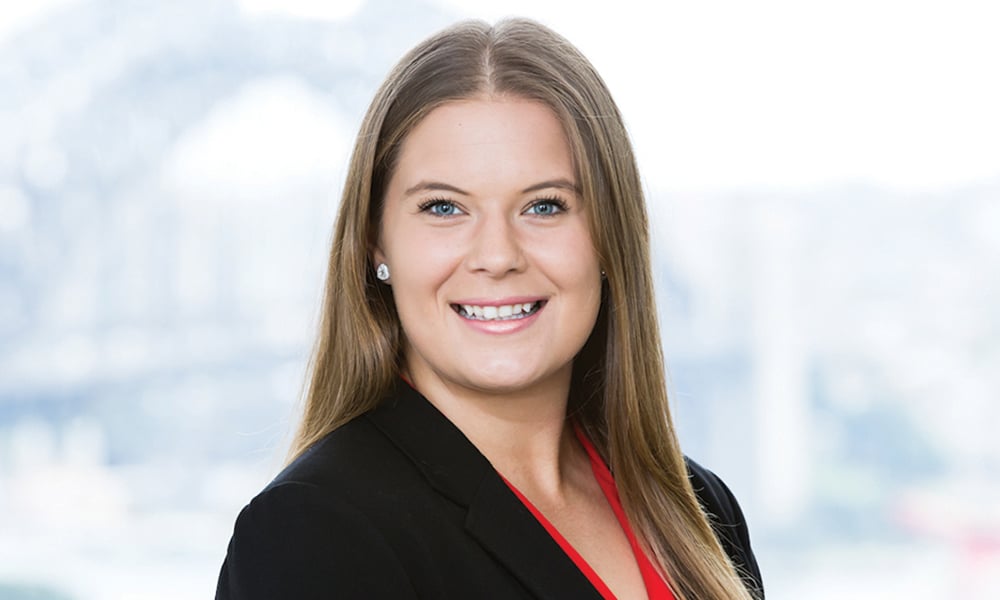
With the uncertainty caused by COVID-19, Charlotte Olsen believes that professionals should have a “safe and supportive” network

As the COVID-19 pandemic continues to impact the globe, Charlotte Olsen believes mental health support should be a key focus for any profession. It is important for professionals to have a safe network through which they can discuss how they’re mentally coping with the uncertainty, she said.
As a part of commercial law team at MacPherson Kelley’s Sydney office, Olsen has seen the pandemic impact her clients when it comes to large-scale transactions, and how lawyers now need to take a closer look at the fine print in contracts in order to better protect the businesses they act for.
In this interview, Olsen also talks about her interest in a “niche” area of law, the firm’s welcoming attitude towards new hires, having her honours thesis published and embracing remote work during the pandemic.
What made you choose a career in law?
I studied Legal Studies in year 11 and 12 at school and realised that I wanted to help people and businesses in the legal space. I also thoroughly enjoyed English and thought it best to combine the content of those subjects through a combined degree of bachelor of laws/bachelor of communications and media.
Towards the end of my combined degree, I realised that my passion for the law wasn’t necessarily “mainstream”—my favourite subjects were what some might consider to be the niche legal areas of sports, media and intellectual property.
What do you love most about your job?
I am lucky enough to have had exposure to a breadth of elements that make up commercial law. No two days are ever the same for me: one day I will be rushing off to court to instruct a barrister or appear at a direction’s hearing; whilst on another day I am drafting a cease-and-desist letter or reviewing and advising a client on the terms of a supplier agreement. Exposure to both transactional-based matters and commercial litigation has provided me with the tools to consider the front and back ends of my client’s matters, keeping in mind their commercial goals whilst also weighing up risk and the implications/obligations placed on my clients.
What is going on at the firm? Are there any new programs and initiatives that you’re particularly interested in?
MK has always got a lot going on, which is something I really love about the firm. We have the MK Foundation, which runs several initiatives and in-house fundraising events like morning teas and silent auctions for some really important charities. We also have a buddy system set up for new starters to the firm, which shows MK’s inclusive attitude towards all its staff members.
During the COVID-19 pandemic, we have been working remotely and the firm has really embraced new technology to ensure we are all staying connected with both our colleagues and of course, our clients.
What has been your proudest accomplishment in the last year or so?
My professional highlight in the last year is having my honours thesis published in volume 36 of the Copyright Reporter. It is a piece that I am very proud of and thoroughly enjoyed writing, as it mixes my love for intellectual property and sport into one.
What should the profession and law firms focus more on?
I think it is evident from the COVID-19 pandemic that through the use of technology, the legal landscape has adapted to working remotely very well. I think now is a good time for firms to be having discussions about more flexible working arrangements for its staff.
The COVID-19 pandemic has also resulted in a lot of uncertainty and having a safe and supportive network for professionals to discuss how they are coping mentally should remain a key focus for any profession, including law firms.
What are the challenges you expect in your practice, and in the business of law in general, going forward? What challenges are particularly pressing in the country’s legal industry? What has been the biggest challenge you and your practice has faced amid the pandemic?
The COVID-19 outbreak has affected the day-to-day operation of businesses. As a result, I have found that during the pandemic, clients’ appetites for large-scale transactions have decreased, and the “boilerplate” clauses in contracts, in particular force majeure protections, are being looked at with added importance.
I think moving forward, businesses will want to take greater care in negotiating the smaller fine print in contracts, and I will be continuing to encourage and assist my clients in putting in place those practical and effective measures to minimise any loss and maximise protection of their businesses.
What are you looking forward to the most in the coming year?
I am looking forward to continuing to help clients with their businesses as they transition into the “new norm.” I think new trends will arise within the business landscape, allowing businesses to continue to innovate and unlock new business opportunities.
It is also a very interesting time in the intellectual property world, with innovation patents soon to be a thing of the past. The Australian designs system is getting a makeover and soon, the High Court will determine whether it will grant Kraft leave to appeal in the unregistered trade mark Bega and Kraft saga.